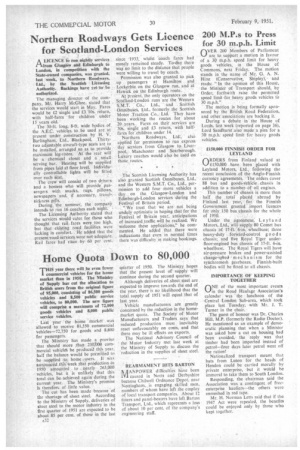commercial vehicles for the home market than in 1950. The
Page 34

If you've noticed an error in this article please click here to report it so we can fix it.
Ministry of Supply has cut the allocation to British users from the original figure, of 95,000. consisting of 86.500 goods vehicles and 8,500 public service vehicles, to 80,000. The new figure will comprise a maximum of 72,000 goods vehicles and 8,000 public service vehicles.
Last year the home market was allowed to receive 81,550 commercial vehicles-72,750 for goods and 8,800 for passengers. The Ministry has made a proviso that should more than 230)00 commercial vehicle's be produced this year, half the balance would be permitted to be supplied to home -users. It Was announced this week that production -in 1950 amounted. to nearly 263,000 • vehicles, but it is unlikely that this total can be achieved again during the current year. The Ministry's promise is therefor, of little value. The cut has been made because of the shortage of sheet steel. According to the Ministry of Supply, deliveries of sheet steel to the motor industry in the first quarter of 1951 are expected to be about 85 per cent. of those in the last qularter of 1950. The Ministry hopes that the present level of supply will continue during the second quarter. Although deliveries of sheet steel are expected to improve towards the end of the year, there is no likelihood that the total supply of 1951 will equal that of last year. Vehicle manufacturers are greatly concerned by the reduCtion in the homemarket quota. The Society of Motor Manufacturers and Traders says that reduced production must inevitably react unfavourably on casts, and that there may be ill effects on exports. The National Advisory Council of the Motor 'Industry met last week at the Ministry of Supply to discuss the reduction in the supplies of sheet steel.
REARMAMENT HITS BARTON NJTANPOWER difficulties have been MI caused in Notts and Derbyshire because Chilwell Ordnance Depot. near Nottingham, "is engaging skilled men, numbers of whom have left the employ of local transport companies. About 12 titters and panel-beaters have left Barton Transport. Ltd.. which represents a loss of about 10 per cent, of the company's engineering staff.




























































































